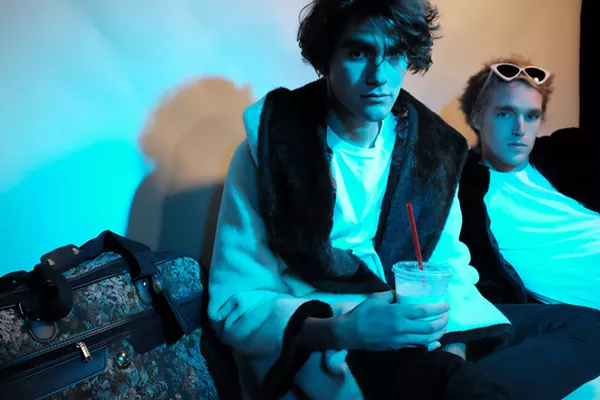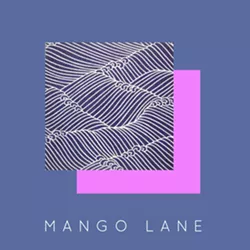Mango Lane is a groovy four-piece based out of Detroit, and this Friday, June 16, they’re having a record release show at the Loving Touch. Admission is free and it will totally be worth the trip. Austin Carpenter and Jack Engwall have been writing and recording tunes for seven years, and now their live jams will be extra funky thanks to their talented additions to the band, Ian
We spoke with the local groove masters about how Mango Lane started, their new album, and other ins-and-outs that showcase the characters that make up the band.
Metro Times: So, what is Mango Lane and what’s the new album going to be like in comparison to your EP, TV Feelings?
Austin Carpenter: Mango Lane is the idea of being happy and positive the way you are, and helping other people embrace that. And this sound [their new self-titled album] is a culmination of TV Feelings and a couple EPs we dropped before. TV Feelings kind of had a soulful vibe, and kind of like indie psychedelic elements per se — we just mixed that together to make a good pop record, I guess.
MT: How did Mango Lane start?
Jack Engwall: Well
Carpenter: But, then we started writing songs together... and we realized our songwriting style is similar, so we just started doing songwriting together and thought “oh, this is sick,” so it just started happening I guess.
Engwall: We’re kinda like brothers in a way; we have very similar minds so we just gel naturally.
MT: So how did you guys [Ian Ruhala and Anthony Spak] get into Mango Lane?
Ian Ruhala: I met Austin Carpenter at Dally in the Ally, I was playing a set for the Hala band, my group, and I met Mr. Carpet, thought he was Jack at first. We had a little thing and then hung out a little bit, but prior to that, I knew Mr. Spak. We all knew Mr. Spak from other bands like Pines/Greet Death and it grew into this.
Engwall:
Anthony
Carpenter: I could kiss you right now, Anthony.
MT: What are some of your favorite bands?
Engwall: Yeah Chicano Batman is the SHIT.
Ruhala: See, I have a guy who likes to wear jeans and listen to William Nelson’s Shotgun Willie, and Bob Seger. I got my darker side that likes to fuck with The Cure and 80s stuff my mother showed me. I’ve got the indie-hippie vibe with some real estate.
Engwall: We’re kinda suckers for that typical Indie Shit. You know like Beach Fossils and Phoenix.
Carpenter: Can’t go wrong with Phoenix. Can’t go wrong with some '80s Madonna either. We love hip hop too — Quasimoto and Thundercat.
Engwall: We pretty much say Lord Quasi’s name like every interview that we’ve ever done, which is like 5.
Ruhala: All music has its time and place.
MT: What kind of music do you think is for this time and this place?
Engwall: That’s what we’re trying to do, that’s the goal of this band. We want to make modern music. We want to make music for this generation. 2017, right now.
MT: So, what else do you do besides music?
Engwall: Skateboard.
Carpenter: School, work, skateboard.
Ruhala: Clean my apartment
Engwall:
[Everyone claps.]
MT: What do you want people to know about?
Carpenter: We come in peace, man.
[Everyone repeats Carpenter.]
Engwall: Bright colors are always good. Skateboarding is fun.
Ruhala: Respect your elders.
Engwall: Respect your elders. Live your life. Have fun. Come on out, we’re gonna play a cool show.
Ruhala: Smoke weed every day, except when your moms around.
Engwall: Only if you like it.
MT: How did you each know that music was what you wanted to do?
Ruhala: I was in orchestra and jazz band all throughout school, but I was never classically trained because
Carpenter: My dad has been playing music forever. He’s the man, he rips. So, ever since I was little I was like “Man I want to be ripping that guitar.” I think around 12 years old I started playing a bunch...as soon as I started realizing I could write my own songs music became a lot more interesting...As soon as Jack showed me this one Beach Fossils riff, it super changed me. It was “The Horse” and ever since he showed me that song...It was like damn, you can make music sound weird and all your own, and that’s what I’ve been chasing. Going against what Ian said, I go to school for music. I understand where he’s coming from with it being all scientific. I want to learn all of the science behind it and then break the rules. That’s kind of thing with jazz; you learn the rules to break them.
Engwall: I always liked music, my parents liked music. They got me into music, but I never played music until I was like 13. I was watching School of Rock and stuff and Zach Mooney was playing guitar and I was like “Man I want to do that.” Then I met Austin and started learning how to play the guitar and I started learning how to play songs and I started putting time into it. I learned like three chords and I was like man, this is just as fun as skateboarding. That’s why I wanted to do it — just say that skateboarding's rad.



